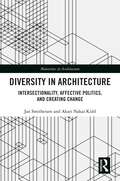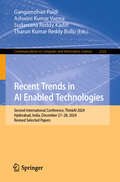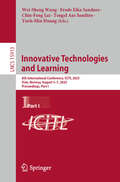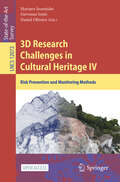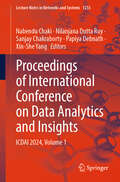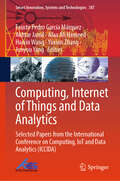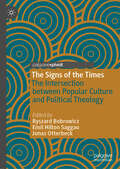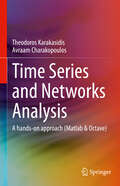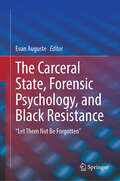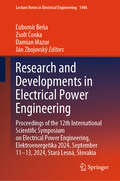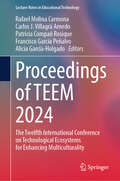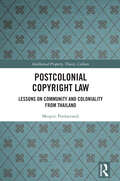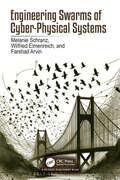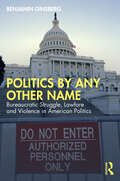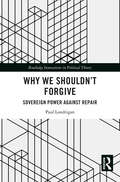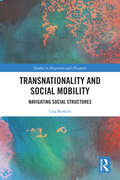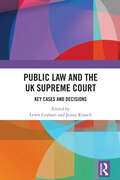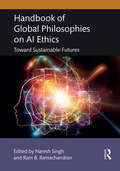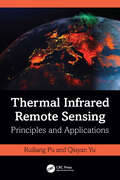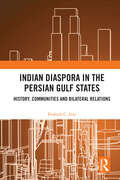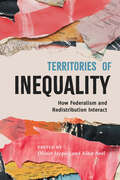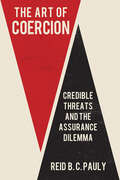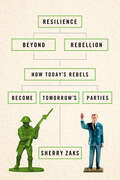- Table View
- List View
Diversity in Architecture: Intersectionality, Affective Politics, and Creating Change (Minorities in Architecture)
by Jan Smitheram Akari Nakai KiddDiversity in Architecture: Intersectionality, Affective Politics, and Creating Change explores diversity in architecture through an intersectional lens. It examines how overlapping individual identities, cultural ideologies, and institutional practices shape the profession.Divided into two parts, this book first explores how values, norms, and ideologies are constructed, circulated, and reinforced through media representations – both from without and from within. The second leans into voices from academics and architects within spaces of education and practice, who share their lived experiences navigating power structures and affective politics that marginalise diverse voices. Considering praxis and actions to create change where care is central, it asks: what happens if we bring intersectionality to the picture of diversity in architecture – through media, education, practice? How can affective solidarity and relationality foster change? What role does intersectional care play in dismantling systemic barriers and reimagining a more inclusive future? Written in dialogue with, and for architectural academics, practitioners, students, as well as wider audiences invested in diversity, this book opens its readers to the importance of mobilising diversity in architecture through intersectionality and affect, towards lasting change.
Recent Trends in AI Enabled Technologies: Second International Conference, ThinkAI 2024, Hyderabad, India, December 27–28, 2024, Revised Selected Papers (Communications in Computer and Information Science #2322)
by Gangamohan Paidi Ashwini Kumar Varma Sudarsana Reddy Kadiri Tharun Kumar Reddy BolluThis book constitutes the refereed proceedings of the Second International Conference on Recent Trends in AI Enabled Technologies, ThinkAI 2024, which took place in Hyderabad, India, during December 27-28, 2024. The 18 full papers in this book were carefully reviewed and selected from 75 submissions. These papers focus on topics of AI enabled technologies, including machine learning, soft computing, and deep learning algorithms.
Innovative Technologies and Learning: 8th International Conference, ICITL 2025, Oslo, Norway, August 5–7, 2025, Proceedings, Part I (Lecture Notes in Computer Science #15913)
by Yueh-Min Huang Frode Eika Sandnes Chin-Feng Lai Wei-Sheng Wang Tengel Aas SandtrøThe two-volume set, LNCS 15913 and 15914, constitutes the refereed conference proceedings of the 8th International Conference on Innovative Technologies and Learning, ICITL 2025, held in Oslo, Norway, during August 5–7, 2025. The 82 papers included in these proceedings were carefully reviewed and selected from 214 submissions. The papers are organized in the following topical sections: Part I: Artificial Intelligence in Education; Computational Thinking in Education; Design and Framework of Learning Systems; VR/AR/MR/XR in Education. Part II: Pedagogies to Innovative Technologies and Learning; STEM/STEAM Education; Application and Design of Generative Artificial Intelligence in Education.
3D Research Challenges in Cultural Heritage IV: Risk Prevention and Monitoring Methods (Lecture Notes in Computer Science #13577)
by Marinos Ioannides Daniel Oliveira Giovanni IssiniThis open access book presents a collection of papers focusing on a range of digital technologies and their use in the protection and restoration of cultural heritage. Digital tools - from 3D scanning and photogrammetry to Heritage Building Information Modeling (HBIM), Digital Twins, and Extended Reality (XR) - are transforming the way we understand and care for tangible heritage. These technologies are applied to both record the physical form and material conditions of a site and to permit simulations of deterioration, design interventions, and careful reconstruction. A central theme of this volume is post-disaster restoration and how the scientific and technical aspects of restoration can be made accessible to a broader audience through innovative visualizations, interactive platforms and storytelling. Digital tools should not only serve experts but also allow the public to participate both on-site and remotely via the web. This book advocates a holistic approach to heritage management, combining cutting-edge technology with local knowledge, risk analysis with creative reuse, and positioning the act of restoration as a bridge connecting the past, present and future.
Proceedings of International Conference on Data Analytics and Insights: ICDAI 2024, Volume 1 (Lecture Notes in Networks and Systems #1233)
by Nabendu Chaki Xin-She Yang Sanjay Chakraborty Nilanjana Dutta Roy Papiya DebnathThe book is a collection of peer-reviewed best selected research papers presented at the International Conference on Data Analytics and Insights (ICDAI 2024), organized by Techno International, Kolkata, India, during July 25–27, 2024. The two volumes of the book cover important topics like sensor and network data analytics and insights; big data analytics and insights; biological and biomedical data analysis and insights; optimization techniques, time series analysis and forecasting; power and energy systems data analytics and insights; civil and environmental data analytics and insights; and industry and applications.
Computing, Internet of Things and Data Analytics: Selected Papers from the International Conference on Computing, IoT and Data Analytics (ICCIDA) (Smart Innovation, Systems and Technologies #387)
by Fausto Pedro García Márquez Akhtar Jamil Alaa Ali Hameed Haixin Wang Yuxian Zhang Junyou YangThis proceedings book offers a multidimensional exploration of the latest advancements in data science and technology, providing valuable insights for researchers, professionals, and enthusiasts in the rapidly evolving field. Each chapter delves into specific topics, offering a blend of theoretical foundations, practical applications, and future perspectives to keep readers abreast of the cutting-edge developments in these critical domains.
The Signs of the Times: The Intersection between Popular Culture and Political Theology (Contemporary Religion and Popular Culture)
by Jonas Otterbeck Ryszard Bobrowicz Emil Hilton SaggauThis book delves into the dynamic interplay of popular culture and political theology, examining three key areas of interaction: engagement with liturgy and scripture, film and television, and music. From depictions of Jesus in South Park and Family Guy to Beyoncé’s Lemonade, from cinematic scandals to portrayals of atheists and holy fools in film, from Islamic pop music to Bible-themed cookbooks and church yoga practices, this book explores how religious individuals and communities incorporate popular culture into their political theologies across diverse sets of beliefs and practices. In this way, the book heralds a renewed focus on popular culture’s theological potential and its impact on the collective imagination. This volume will captivate researchers in theology, religious studies, cultural studies, media studies, and sociology of religion, as well as general readers intrigued by religious themes in contemporary culture.
Time Series and Networks Analysis: A hands-on approach (Matlab & Octave)
by Theodoros Karakasidis Avraam CharakopoulosThis textbook provides students with a hands-on introduction to time series analysis. Readers will learn the potential of the methods but also benefit from a step-by-step guide to apply them on simple data, as well as applications in real science in domains such as physics, environmental science, physics of fluids, simulation analysis etc. The authors emphasize application of the techniques and modern methodologies for time series analysis, using examples to demonstrate techniques introduced, including detailed, step-by-step solutions. Octave and Matlab are used as the computational environment for the applications, since the readers can find programs easily for many applications. The commands are clearly explained and the files are provided in the text and online.
The Carceral State, Forensic Psychology, and Black Resistance: "Let Them Not Be Forgotten"
by Evan AugusteThis volume outlines the theoretical and ethical commitments for forensic psychologists in the struggle for Black liberation and details areas of focus for practice and research. It aims to highlight how Black forensic psychologists have historically engaged in these areas through the lens of Black psychology. The chapters that follow extensively cover the often overlooked relationship between forensic psychology and Black liberation, including chapters on: • Black forensic psychologists whose work contributed to political movements; • The psychologist&’s role in supporting reparations movements; • The importance of community healing collectives as alternatives to incarceration and policing; • Recommendations for introducing Black psychology into forensic practice. Examining the role of forensic psychology within America&’s racialized carceral systems, this book critically analyzes how psychological research and practice influence legal and material outcomes for Black individuals. Grounded in historical context and contemporary case studies, it offers essential insights for practitioners, activists, and scholars committed to challenging the systemic harms that disproportionately affect Black communities within the most incarcerated nation in the world.
Research and Developments in Electrical Power Engineering: Proceedings of the 12th International Scientific Symposium on Electrical Power Engineering, Elektroenergetika 2024, September 11–13, 2024, Stará Lesná, Slovakia (Lecture Notes in Electrical Engineering #1446)
by Damian Mazur Ľubomír Beňa Zsolt Čonka Ján ZbojovskýThis book offers a timely report on challenges and solutions relating to electrical power engineering. It discusses current issues in generation, transmission, distribution and consumption of electricity, and presents improved methods for diagnostics, faults analysis and system control in power engineering. Further, it covers smart grids, applications of AI, and big data in power systems. A special emphasis is given to sustainable electricity production. Economic and business strategies are also discussed. Gathering the proceedings of the 12th International Scientific Symposium on Electrical Power Engineering, Elektroenergetika 2024, held on September 11–13, 2024, in Stará Lesná, Slovakia, this book offers extensive information and a source of inspiration for both scientists and professionals involved in developing safe, reliable and sustainable solutions for energy supplies of the future.
Proceedings of TEEM 2024: The Twelfth International Conference on Technological Ecosystems for Enhancing Multiculturality (Lecture Notes in Educational Technology)
by Alicia García-Holgado Francisco García Peñalvo Rafael Molina Carmona Carlos J. Villagrá Arnedo Patricia Compañ RosiqueThis volume comprises of the proceedings of The Twelfth International Conference on Technological Ecosystems for Enhancing Multiculturality (TEEM). It reflects outstanding advances, with a multidisciplinary perspective, in the technological ecosystems that support Knowledge Society building and development. This book covers broad-scope research areas, such as Educational Assessment and Orientation, Human-Computer Interaction, eLearning, Computers in Education, Communication Media and Education, Medicine and Education, Learning Analytics, Engineering Education, Robotics in Education, Diversity in Education, Smart Learning and Gamification, and Games for Learning. TEEM is divided into fifteen thematic and highly cohesive tracks, each of which is oriented to a specific community of interest, including researchers, professionals, and students. Additionally, the multidisciplinary approach allows cross-track interest, which enhances the value of the overall volume.
Postcolonial Copyright Law: Lessons on Community and Coloniality from Thailand (Intellectual Property, Theory, Culture)
by Mespiti PoolsavasdiThis book appraises postcolonial perspectives to rethink the meaning of copyright and makes suggestions for its future within the global landscape of intellectual property law.Drawing on the experience of Thailand as a case study, a country with a unique yet marginal position in discussions on colonialism, the book offers valuable insights for the international field of copyright law. Thai copyright law emerged in an era when the threat of European colonial powers inspired local ruling elites to embark on a quest for modernisation and establish a modern absolutist state. One can observe similar dynamics in the recent promotion of Thailand’s Creative Economy. Contrary to these top-down developments, the book argues for greater attention to attitudes and practices on the ground. Taking an interdisciplinary approach informed by film studies, area studies, decolonial studies, and legal sociology, the book makes a case to redefine copyright as a community resource.The book will be of interest to researchers in the field of copyright law, postcolonial and decolonial studies, and sociolegal studies.
Engineering Swarms of Cyber-Physical Systems
by Wilfried Elmenreich Farshad Arvin Melanie SchranzEngineering Swarms for Cyber-Physical Systems covers the whole design cycle for applying swarm intelligence in Cyber-Physical Systems (CPS) and guides readers through modeling, design, simulation, and final deployment of swarm systems. The book provides a one-stop-shop covering all relevant aspects for engineering swarm systems. Following a concise introduction part on swarm intelligence and the potential of swarm systems, the book explains modeling methods for swarm systems embodied in the interplay of physical swarm agents. Examples from several domains including robotics, manufacturing, and search and rescue applications are given. In addition, swarm robotics is further covered by an analysis of available platforms, computation models and applications. It also treats design methods for cyber-physical swarm applications including swarm modeling approaches for CPSs and classical implementations of behaviors as well as approaches based on machine-learning. A chapter on simulation covers simulation requirements and addresses the dichotomy between abstract and detailed physical simulation models. A special feature of the chapters is the hands-on character by providing programming examples with the different engineering aspects whenever possible, thus allowing for fast translation of concepts to actual implementation. Overall, the book is meant to give a creative researcher or engineer the inspiration, theoretical background, and practical knowledge to build swarm systems of CPSs. It also serves as a text for students in science and engineering.
Politics by Any Other Name: Bureaucratic Struggle, Lawfare and Violence in American Politics
by Benjamin GinsbergThis book critiques a modern U.S. political system characterized by the partisan weaponization of bureaucratic systems and institutions.Competition for political power in the United States today is not just about winning elections. Competing political forces attempt to win at the polls, but they do not bet all their chips on electoral outcomes. Each party has built an institutional bastion within portions of the federal bureaucracy. Each party makes use of judicial and criminal proceedings for partisan purposes—a practice dubbed “lawfare” by the national media. And, acting through various surrogates, each party sponsors “violence by proxy,” to achieve its ends. To the extent that political struggles are fought outside the electoral arena, ordinary Americans have little or no voice in public affairs. And, unfortunately, in the United States today, a good deal of political struggle takes place outside the electoral arena.This book will be used in undergraduate and graduate classes in political parties, electoral politics, and in general U.S. government classes.
Why We Shouldn’t Forgive: Sovereign Power Against Repair (Routledge Innovations in Political Theory)
by Paul LondriganWhy We Shouldn’t Forgive invites you to understand how the practice of political forgiveness and sovereignty has changed, evolved, and developed over time.Political forgiveness is an awesome power that bears the promise of great benevolence, but this does not mean, as Paul Londrigan argues, that we should forgive. By engaging with the subject of political forgiveness in relation to sovereignty, Londrigan offers original insights into forgiveness as part of an analysis of prerogative power. As a result, what forgiveness does, and how it has been understood in the history of political thought, becomes intelligible. Six substantive chapters that investigate and substantiate the argument that we should not forgive follow the introduction. Each chapter adopts a seminal figure in the history of political thought beginning with Niccolò Machiavelli, and charts a course through Jean Bodin, Thomas Hobbes, John Locke, and Alexis de Tocqueville. As the chapters unfold across thinkers and through time, they build on one another. The resulting narrative illustrates how political forgiveness and sovereign power have evolved, and crucially, how the anxieties and preoccupations of his interlocutors change in accordance with who exercises sovereignty and who benefits or suffers from the dispensation of forgiveness.Why We Shouldn’t Forgive fills an important gap in advancing this fascinating field of research. This book is required reading for students and academics interested in contemporary approaches to reparative politics, studies of post-conflict reconciliation, and those who seek a deeper understanding of the politics of pardon and amnesty, as well as scholars who engage with critiques of sovereign power.
Transnationality and Social Mobility: Navigating Social Structures (Studies in Migration and Diaspora)
by Lisa BonfertConsidering that changes in people’s life chances are increasingly shaped by cross-border movements and transnational connections, this book proposes a transnational conception of social mobility. Emphasising the manifold ways in which contexts of migration and transnationality affect perceptions and evaluations of betterment, the book argues for linking the study of social and spatial mobility to better capture how people navigate social structures of inequality in a globalised world.Based on the experiences of people who moved to Germany to improve their lives in some way, this book links empirical findings with theoretical considerations from transnational and intersectional scholarship to propose an alternative concept of social mobility that emphasises people’s subjective interpretations of success and failure in their search of betterment.Drawing on the concepts of social spaces, capitals, and reference group theory, a model of the cogwheels of social mobility is proposed to account for the varying ways in which cross-border migration and transnational connections initiate changes in people’s social position within and across country borders.This book will therefore be of interest to scholars of sociology, geography and politics with interests in migration, transnationalism and mobility.
Public Law and the UK Supreme Court: Key Cases and Decisions
by Lewis Graham Jenny RussellThis volume brings together expert commentators across different fields of public law to comment on key decisions by the UK Supreme Court (UKSC).Each author explores their case’s content, as well as its broader implications for public law as a field and the Supreme Court as an institution. The work is divided into the following areas: constitutional law, administrative law and judicial review, human rights, and criminal law and criminal justice. Providing expert commentary on recent authorities of the highest level in one place, the collection will enable readers interested in these areas to conveniently locate analysis that will aid them in their work. Taken together, the contributions enable identification of persistent themes within subject areas.As such, it will be an invaluable resource for academics, researchers, practitioners, judges, and policymakers.
Handbook of Global Philosophies on AI Ethics: Toward Sustainable Futures
by Naresh Singh Ram B. RamachandranThis book offers an exploration of the diverse perspectives shaping the future of artificial intelligence (AI), highlighting the influence of non-Western thinking in its development. What would the impact be if AI were developed with the wisdom of Ubuntu, the harmony of Confucian thought, or the Indian principle of Vasudhaiva Kutumbakam, "the world is one family", at its core? This thought-provoking collection brings together leading voices from around the globe to reimagine AI systems that are fair, ethical, and inclusive. Addressing critical issues such as bias, fairness, privacy, and existential risks, it challenges the status quo and envisions a future where AI reflects the values of all humanity—not just a select few. Exploring the influence of topics like religion, culture, and social movements, the book examines how these perspectives shape AI’s application in industries such as finance, education, and the military, while underscoring the importance of establishing robust ethical guardrails. Whether you’re a curious reader, a policy maker, a scholar, or a tech innovator, this book is your guide to understanding how different cultural perspectives can redefine AI ethics. It’s time to ask: what kind of world do we want AI to build for us all?
Thermal Infrared Remote Sensing: Principles and Applications
by Ruiliang Pu Qiuyan YuThis book systematically and comprehensively introduces concepts, theories, principles, and applications of Thermal Infrared (TIR) imaging spectral techniques and TIR remote sensing. It introduces in detail algorithms, techniques, and methods for processing and analyzing TIR data, including radiometric calibration and atmospheric correction in TIR region, retrieving land surface emissivity and temperature (LST) from various TIR data, and downscaling LST and TIR radiance spatiotemporally. Focusing on TIR-RS application orientation, this book introduces state-of-the-art techniques and methods applied in areas such as hydrology, biomass burning, urban thermal environment, and other areas of interest.Features: Presents a complete coverage of thermal infrared remote sensing, from concepts to applications. Provides a thorough survey of characteristics and types of airborne and spaceborne TIR sensors, systems, and missions. Discusses principles and methods of radiometric calibration and atmospheric correction for correcting TIR data. Includes case studies that demonstrate the applicability and potential of a variety of techniques and methods to process TIR data. Offers a comprehensive review of TIR remote sensing applications. This book is a great resource for professionals in the academic and corporate world and an insightful reference for graduate and senior undergraduate students studying geology, geography, geophysics, and environments, as well as natural resources and survey management.
Using Spirituality in Psychotherapy: The Heart Led Approach to Clinical Practice
by Alexandra DentUsing Spirituality in Psychotherapy: The Heart Led Approach to Clinical Practice offers a means for therapists to integrate a spiritual perspective into their clinical practice.The book provides a valuable alternative to traditional forms of psychotherapy by placing an emphasis on purpose and meaning. Introducing a spiritually informed model, Heart Led Psychotherapy (HLP), the book uses a BioPsychoSocioSpiritual approach to treat psychological distress. Based on the premise that everyone is on an individual life journey, HLP teaches clients to become an observer, identifying the life lessons that they are being asked to understand or experience. The model can be used whether a client has spiritual beliefs or not, enabling them to make new choices that are in keeping with their authentic selves and to live a more fulfilled and peaceful life. This new edition includes updated references and new material on transpersonal psychology, spiritual awakening, working within the quantum field, significance of the heart and heart coherence.Illustrated by case studies to highlight key points and including a range of practical resource exercises and strategies, this engaging book will have wide appeal to therapists and clinicians from a variety of backgrounds.
Indian Diaspora in the Persian Gulf States: History, Communities and Bilateral Relations
by Prakash C. JainIndian Diaspora in the Persian Gulf States focuses on the historical as well as the contemporary aspects of the Indian diaspora of the region where small Indian merchant communities called Banians already existed for centuries. Persian Gulf countries emerged as rentier states since the 1970s, mainly due to the development of the oil industry, which transformed the region from subsistence to globalized capitalist economies. In these economies, the role of sponsored Indian expatriate immigrants numbering at least 20 million during the past half century was vitally important. Taking the rentier state as the theoretical perspective, the author argues that the sponsorship (kafala) system tended to have a different impact on the Indian expatriates: incorporation and promotion of the entrepreneurs and professionals as business elites and the perpetual exploitation of the working classes. The book is not only the first-ever definitive and comprehensive work on the Indian diaspora in the nine countries of the Gulf region, it also stands as the author’s final statement on his three-odd decades of research and writing on the subject. Besides highlighting the role of Indian diaspora, the book also profiles all the Gulf-based recipients of the Pravasi Bharatiya Samman Awards. Bilateral trade, investment and political relations between India and individual Persian Gulf states constitute another focus area of the volume. The volume will be an interesting read for teachers, researchers and policy-makers connected with migration and diaspora studies, labour studies, political economy, international relations and geopolitics.
New Orleans: A Concise History of an Exceptional City
by Charles D. ChamberlainIntended for general readers, Charles D. Chamberlain’s New Orleans: A Concise History of an Exceptional City offers a broad, reliable overview of the city’s history. Although many excellent books are available that focus on specific eras in the Crescent City, this book is the first fully inclusive scholarly history that is engaging and easy to follow.In addition to a general historical narrative, each chapter provides a list of relevant historical sites and a carefully selected recipe to make the city’s history come to life through site visits and culinary pursuits. Chamberlain encourages readers to experience the spirit of New Orleans first-hand by exploring its landscape and interacting with its cuisine.New Orleans: A Concise History of an Exceptional City is a trusty reference for tour guides and a valuable, interactive resource for general readers interested in the fascinating history of one of America’s most unique cities.
Territories of Inequality: How Federalism and Redistribution Interact (Democracy, Diversity, and Citizen Engagement Series)
by Alain Noël Olivier JacquesThe rise of income and wealth inequality and the possibilities of redistribution animate contemporary social and political debates, but much of the scholarship on the issue is limited to the individual level. There is a spatial dimension to the redistribution of income, however, and in federations, this is especially important.In Territories of Inequality leading political scientists propose a territorial approach to inequality and redistribution, informed by political economy, political geography, and a comparative analysis of federalism and multilevel governance. Chapters explore the relationship between interpersonal and interregional redistribution, the role of progressive or regressive governing coalitions, and the foundations of individual preferences for or aversions to interregional redistribution. They consider different federations and quasi-federations and emphasize the unique situation of Indigenous Peoples, who navigate a complex relationship with institutions shaped by colonialism.Examining how decentralization and federalism influence policy outcomes and public preferences, Territories of Inequality provides new ways to approach the question of redistribution.
The Art of Coercion: Credible Threats and the Assurance Dilemma (Cornell Studies in Security Affairs)
by Reid B. PaulyThe Art of Coercion presents a fresh explanation for the success—and failure—of coercive demands in international politics.Strong states are surprisingly bad at coercion. History shows they prevail only a third of the time. Reid B. C. Pauly argues that coercion often fails because targets fear punishment even if they comply. In this "damned if you do, damned if you don't" scenario, targets have little reason to obey. Pauly illustrates this logic in nuclear counterproliferation efforts with South Africa, Iraq, Libya, and Iran. He shows that coercers face an "assurance dilemma": When threats are more credible, assurances not to punish are less so. But without credible assurances, targets may defy threats, bracing for seemingly inevitable punishment. For coercion to work, as such, coercers must not only make targets believe that they will be punished if they do not comply, but also that they will not be if they do. Packed with insights for any foreign policy challenge involving coercive strategies, The Art of Coercion crucially corrects assumptions that tougher threats alone achieve results.
Resilience beyond Rebellion: How Today's Rebels Become Tomorrow's Parties
by Sherry ZaksResilience beyond Rebellion addresses a critical question in insurgency studies: Why some rebel groups successfully become political parties, while others die trying. Only half of rebel groups with political aspirations manage to reinvent themselves as lasting political parties. Sherry Zaks argues that the key to successful rebel-to-party transformations lies in the organizational structures and institutions that rebels build during wartime. These proto-party structures, which involve governance, political messaging, social outreach, and other noncombat tasks, equip rebel groups with the personnel, skills, and routines needed to succeed in the electoral arena.Zaks draws on insights from organizational sociology to reconceptualize how rebel groups operate. Through examining the Farabundo Martí National Liberation Front in El Salvador and other cases, they demonstrate that rebel groups with established proto-party structures often form the core of post-conflict parties and attract more votes. Innovative in approach and rich in evidence, Resilience beyond Rebellion advances our understanding of rebel group dynamics both during and after conflict by showing that party-building begins not with the last bullet fired but with the very first.
